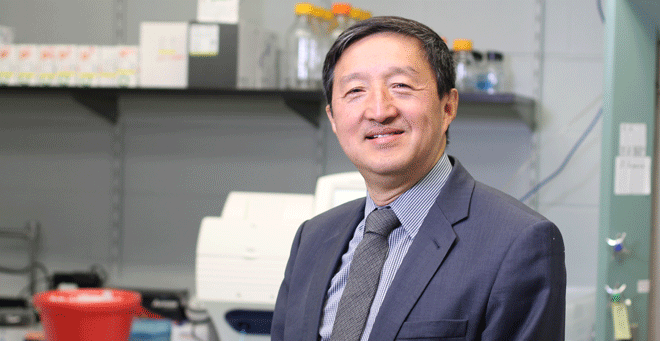Worcester HIV Vaccine, a biotechnology company dedicated to the development of a vaccine to prevent HIV infections around the world, has received clearance from the U.S. Food and Drug Administration for its Investigational New Drug application for a novel polyvalent DNA/prime-protein boost vaccine to prevent HIV, called PDPHV. The application calls for the Worcester-based start-up to explore vaccination designs in a Phase I b clinical trial to be launched in February. A Phase II clinical trial is expected to follow.

Based on discoveries by Shan Lu, MD, PhD, professor of medicine, and licensed from UMass Medical School, Worcester HIV Vaccine’s product employs a polyvalent DNA-prime/protein-boost technology to target multiple subtypes of HIV-1. PDPHV is a novel vaccine composed of five DNA plasmids and four gp120 recombinant proteins. The DNA component is used to prime the immune system to receive a boost of HIV proteins, which stimulate the body to produce potent antibodies against HIV.
“In a little over two years since the founding of Worcester HIV Vaccine, we have filed our first IND. This is a major achievement and a true milestone for Worcester HIV Vaccine,” said Yegor Voronin, PhD, chief operating officer of Worcester HIV Vaccine. “The excellent safety results of PDPHV and positive preliminary immunogenicity data we have from earlier clinical trials give us confidence to rapidly develop our own clinical program.”
An earlier version of this vaccine was tested in a single-site clinical trial conducted at UMass Medical School, and the second generation of the vaccine has been recently tested at six U.S. sites by the HIV Vaccine Trials Network under protocol HVTN 124. The network is funded by the National Institute of Allergy and Infectious Diseases.
James Kublin, MD, MPH, executive director of HVTN, said, “I am very encouraged by the safety data and preliminary immunogenicity results of the HVTN124 trial and excited to see Worcester HIV Vaccine’s further progress in advancing this promising vaccine candidate.”
PDPHV is the first and only vaccine formulation that includes natural viral antigens from all four major circulating HIV subtypes to advance to safety and efficacy trials in humans. Full immunogenicity results from HVTN 124 will be released in 2021.
“In order to stem the global tide of AIDS, finding an effective preventive HIV vaccine is our best hope of breaking the transmission cycle,” said Dr. Lu. “This brings promising new research into an HIV vaccine one step closer.”
Over two decades, Lu’s lab has received more than $50 million in NIAID funding to oversee the development and manufacturing of PDPHV. Worcester HIV Vaccine licensed PDPHV from UMass Medical School in early 2018 for development.
Worcester HIV Vaccine has worked with Waisman Biomanufacturing, a contracted manufacturing organization, to use its proprietary technology to manufacture DNA plasmids with purer quality and higher yields.
Worcester HIV Vaccine is also collaborating with the Infectious Disease Research Institute in Seattle, which developed and manufactured the adjuvant used to stimulate responses to the protein component of the PDPHV vaccine. Adjuvants can be broadly leveraged to develop vaccines against many viruses and are two components of several COVID-19 vaccine candidates to broaden and lengthen the duration of protection against the SARS-CoV-2 virus.
“HIV remains a leading infectious cause of death worldwide and is one of the most challenging viruses to protect against with a vaccine,” said Corey Casper, PhD, chief executive officer of IDRI. “IDRI is excited to contribute its immune-enhancing adjuvant, GLA-SE—with a proven safety and immunogenicity profile in thousands of humans to date—to this critical vaccine effort.”
Recently, Target Health, LLC, a New York-based contract research organization with many years of regulatory experience, joined the Worcester HIV Vaccine team to help prepare and file the IND.
Related stories on UMassMed News:
UMass Medical School HIV vaccine to be tested in new Phase I trial
UMMS receives $17.3 million to oversee manufacturing of HIV vaccine